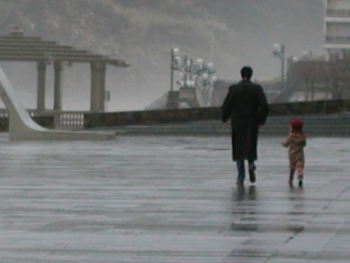I look down at my feet. A piece of tin foil glitters through the scattered leaves on the road. The foil is shaped like a heart. I pick up the debris and place it on my gloved palm. The edges are ragged, one side torn. The heart seems to symbolize my own. I've just come from a trip out west to say goodbye to my older sister whose heart is failing. She'd said, "If you want to see me, you'd better come now. I don't have long." My other two sisters and I find flights out the next day and travel across country to see her one last time.
When I walk into her house, medical equipment and beeping machines intermingle with the items she loves--shelves filled with books, oil paintings and family photographs. Hand-sewn quilts, master works she's created for decades, are draped over chairs and sofas. And there she sits in a chair, attached to a line that pumps medication into her body, keeping her alive. If she turns off the machine, she will die within forty-eight hours. "I'm not going back to the hospital," she says. "I'll know when to turn the machine off." Her body is frail, yet her eyes glisten with determination. She exudes a spiritual strength that is palpable in the house turned hospice. She is, paradoxically, consoling us in her acceptance of traveling death's shadowy pathway.
And so my other two sisters and I sit with her remembering our history, our narrative. At times we are not sad. I'm a generation younger than my three sisters, and remember my oldest sister from a child's perspective. I was fascinated with her as an eight-year-old. She worked as a children's librarian and got me reading early, introducing me to Christopher Robin and the beauty of A Wrinkle In Time. She was slim with auburn hair and deep brown eyes. Freckles dusted the bridge of her nose. She listened to Bob Dylan on a stereo that hung from a wall. She let me spend the night with her at times. I'd climb the wrought iron stairs to her second-floor apartment, my overnight bag in hand, just dying to get into the oval pool I could see through her apartment window. I'd don my swimsuit, and grab my inner tube and goggles. My sister would take me by the hand and we'd traipse off to the pool. She let me stay for hours on those hot Texas days while she sat under an umbrella protecting her porcelain skin. I swam and begged her to watch me as I performed diving tricks. She'd look up from her book and shout, "That's really good. Do it again." After swimming, she'd say, "How about we go over to Kip's and get a Big Boy hamburger?" Then we'd sit in the red vinyl booths, eating our burgers and fries, and I'd think, "This is the best day ever."
When I grew up and had children of my own, my sister gave my daughters books every year for their birthdays. My girls still have those books, inscribed with my sister's flowing, distinct script. One summer my sister and her husband asked the girls out to spend some time in the southwest. My children will never forget that visit. They still talk about their travels--how they listened to Prairie Home Companion as they wound their way up a mountain for a picinic.
And now I'm standing on the banks of the tidal creek at the end of my street. I see a woman paddling a yellow canoe rounding the bend on her way down the smooth creek waters. Her paddle makes light splashing noises with each stroke as she glides away. I have an inclination to wave and raise my arm as she passes by, but she doesn't see me. It's almost as if I'm waving goodbye to my sister. I am sobbing. "Oh, God, it's so hard to let her go, to say goodbye. I sense God's voice, "I know. I know. Remember, though, that her first day in heaven will be better than her most wonderful day on earth. I am her good Father. She will be filled with the wonder and joy of a child as she walks by my side and discovers all I have prepared for her."
I open my hand and see the battered, silver heart. I place it in my pocket. "And I hold your heart, too, and the hearts of all who love your sister with my comfort, for this is not the end. This is not the end."

